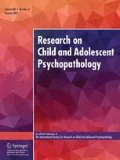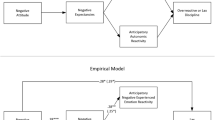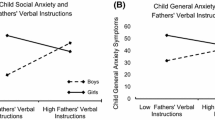Abstract
The effect of children's negative affect on maternal discipline behavior was evaluated in a sample of 39 children (19 to 41 months old) and their mothers. Mothers were randomly assigned to view a videotape that contained either a high level of child negative affect (NA) or no negative affect (NNA). After viewing the videotape, mothers were observed interacting with their own children in three tasks designed to elicit child misbehavior. Mothers in the NA condition displayed significantly greater overreactivity to child misbehavior; no significant difference in laxness was observed between the two groups of mothers. Children of mothers in the NA condition tended to display more misbehavior during the last two tasks of the interaction. Maternal negative affect received mixed support as one possible mediator of this effect.
Similar content being viewed by others
References
Achenbach, T. M. (1992).Manual for the Child Behavior Checklist/2–3 and 1992 Profile. Burlington: University of Vermont, Department of Psychiatry.
Arnold, D. S., O'Leary, S. G., Wolff, L. S., & Acker, M. M. (1993). The Parenting Scale: A measure of dysfunctional parenting in discipline situations.Psychological Assessment, 5, 137–144.
Bartko, J. J. (1976). On various intraclass correlation reliability coefficients.Psychological Bulletin, 83, 762–765.
Beck, A. T., Steer, R. A., & Garbin, M. G. (1988). Psychometric properties of the Beck Depression Inventory: Twenty-five years of evaluation.Clinical Psychology Review, 8, 77–100.
Belsky, J. (1984). The determinants of parenting: A process model.Child Development, 55, 83–96.
Bugental, D. B., & Cortez, V. L. (1988). Physiological reactivity to responsive and unresponsive children as moderated by perceived control.Child Development, 59, 686–693.
Bumberry, W., Oliver, J. M., & McClure, J. N. (1978). Validation of the Beck Depression Inventory in a university population using psychiatric estimate as the criterion.Journal of Consulting and Clinical Psychology, 46, 150–155.
Buss, D. M. (1981). Predicting parent-child interactions from children's activity level. Developmental Psychology,17, 59–65.
Dix, T. (1991). The affective organization of parenting.Psychological Bulletin, 110, 3–25.
Edgington, E. S. (1987).Randomization Tests (2nd ed.). New York: Marcel Dekker.
Finn, R. H. (1970). A note on estimating the reliability of categorical data.Educational and Psychological Measurement, 30, 71–76.
Frodi, A. M., & Lamb, M. E. (1980). Child abusers' responses to infant smiles and cries.Child Development, 51, 238–241.
Gottman, J. M., & Levenson, R. W. (1986). Assessing the role of emotion on marriage.Behavioral Assessment, 8, 31–48.
Hays, W. L. (1963).Statistics for psychologists. (pp. 633–635). New York: Holt, Rinehart and Winston.
Jenkins, S., Bax, M., & Hart, H. (1980). Behaviour problems in pre-school children.Journal of Child Psychology and Psychiatry, 25, 75–89.
Jockel, K. H. (1984). Computational aspects of Monte Carlo tests. Proceedings of COMPSTAT,84, 183–188.
Kimmel, D. C., & Van der Veen, F. (1974). Factors of the marital adjustment testJournal of Marriage and Family, 36, 57–63.
Levenson, R. W., & Gottman, J. M. (1983). Marital interaction: Physiological linkage and affect exchange.Journal of Personality and Social Psychology, 45, 587–597.
Locke, H. J., & Wallace, K. M. (1959). Short marital adjustment and prediction tests: Their reliability and validity.Marriage and Family Living, 21, 251–255.
Lytton, H. (1990). Child and parent effects in boys' conduct disorder: A reinterpretation. Developmental Psychology,26, 683–697.
Patterson, G. R. (1982).Coercive family process. Eugene, OR: Castalia.
Reynolds, W. M., & Gould, S. W. (1981). A psychometric investigation of the standard and short form Beck Depression Inventory.Journal of Consulting and Clinical Psychology, 49, 306–307.
Roberts, W., & Strayer, J. (1987). Parents' responses to the emotional distress of their children: Relations with children's competence.Developmental Psychology, 23, 415–422.
Smith, A. M., & O'Leary, S. G. (in press). A model of harsh and lax parenting.Cognitive Therapy and Research.
Watson, D., Clark, L. A., & Tellegen, A. (1988). Development and validation of brief measures of positive and negative affect: The PANAS Scales.Journal of Personality and Social Psychology, 54, 1063–1070.
Whitehurst, G. J. (1984). Interrater agreement for journal manuscript reviews.American Psychologist, 39, 67–70.
Author information
Authors and Affiliations
Rights and permissions
About this article
Cite this article
Arnold, E.H., O'Leary, S.G. The effect of child negative affect on maternal discipline behavior. J Abnorm Child Psychol 23, 585–595 (1995). https://doi.org/10.1007/BF01447663
Received:
Issue Date:
DOI: https://doi.org/10.1007/BF01447663




